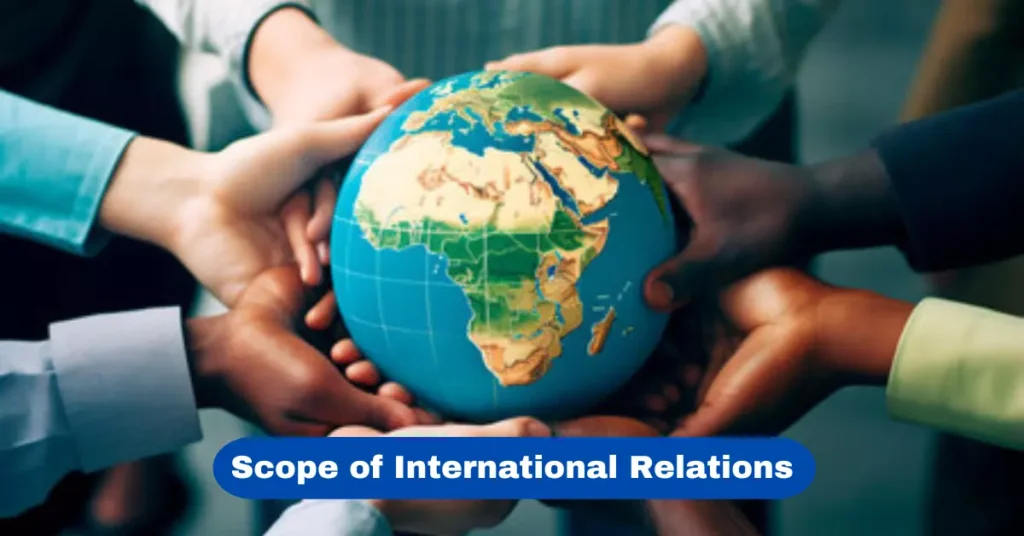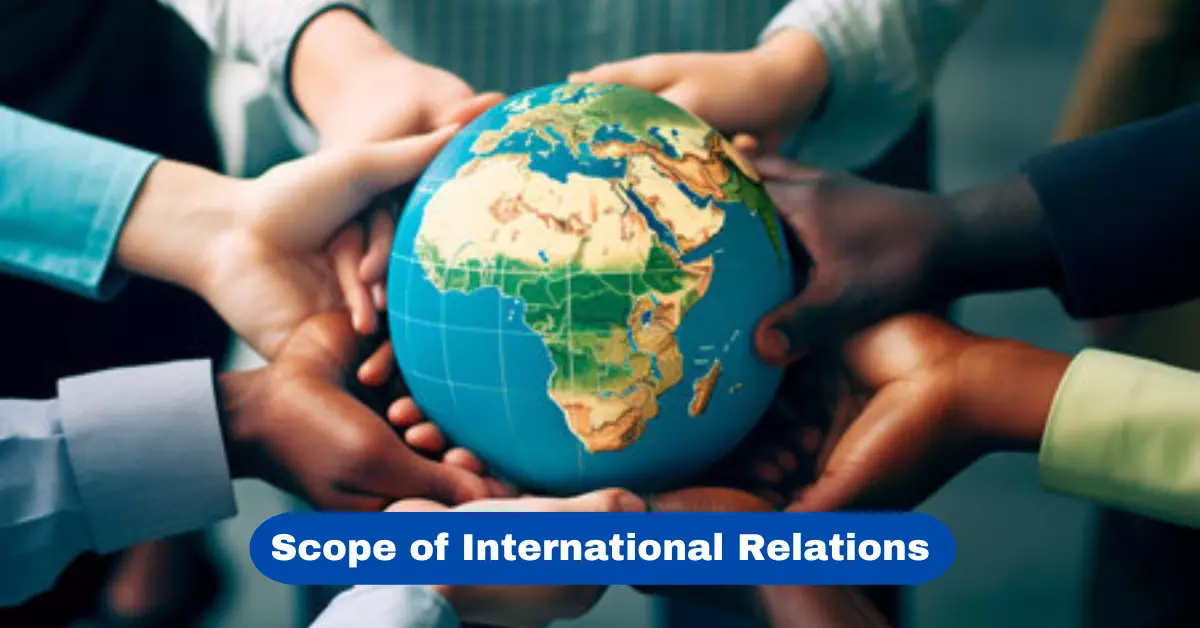Welcome to the expansive world of International Relations. This field, influenced by events and global factors offers insights into how nations interact with each other.

Join us as we explore its meaning, delve into its importance and examine the range of opportunities and challenges it brings. Let’s embark on a journey that uncovers the network of relationships that shape our world.
Understanding the Nature of International Relations
Nature and Characteristics: The study of International Relations (IR) involves the interactions, conflicts, and collaborations, among countries. This field is constantly. Shaped by circumstances, cultural differences, political beliefs and economic inequalities. Its main objective is to understand the nature of affairs and how power dynamics play out.
National Interest Determination: The idea of interest plays a role, in shaping how countries make decisions and behave on the global stage. It encompasses a nation’s goals, concerns for security, economic prosperity and ideological beliefs. Identifying interests is essential when it comes to formulating policies and engaging in diplomatic interactions, with other countries.
Foreign Policy and Its Determinants: Crafting policy is the way a country expresses its goals, on the stage. It requires analysis of factors such, as past alliances, economic factors, security issues, public sentiment and leader viewpoints. Grasping these factors helps us understand why nations make choices in their policies.
Scope and Importance
Need for Studying International Relations: In today’s interconnected world, it is crucial to study International Relations. This field provides knowledge, about challenges such, as climate change, economic interdependence, terrorism and pandemics. By comprehending the intricacies of IR individuals gain the ability to analyze these issues with depth and make informed decisions while effectively solving problems.
Importance for Specific Countries (e.g., Pakistan): International Relations hold importance for countries, like Pakistan. It plays a role in shaping aspects, including foreign policy formulation economic partnerships, security strategies and regional collaborations. When examining the scope of International Relations in Pakistan it becomes evident that it significantly influences the country’s stance, on both global platforms.
Globalization: Challenges & Responses: In today’s world globalization has become a defining characteristic that brings forth prospects and difficulties. It facilitates the exchange of ideas, commerce, and cultural interactions, across borders. However, it also triggers discussions about issues such as independence, economic disparities and the loss of diversity. Grasping these challenges and devising strategies is crucial, for navigating the terrain of globalization.
Global Terrorism: Challenges & Responses: The issue of terrorism goes beyond boundaries. It poses a significant risk, to the security of the entire world. International relations play a role in comprehending the underlying reasons, behind terrorism creating counterterrorism tactics and promoting global collaboration to address this serious problem. It is imperative to analyze these challenges and develop approaches to protect stability worldwide.
Read more about: How to Become an Air Hostess in Pakistan: Career, Jobs & Salary
Career Paths in International Relations
Diplomat Roles: Diplomats play a role, in bridging the gap between nations facilitating conversations brokering deals and advocating for their country’s interests on the international stage. They skillfully navigate terrains employing diplomacy to uphold peaceful relations and find resolutions, for conflicts.
Intelligence Specialist: These experts have expertise in collecting and evaluating information related to the state. Their role includes analyzing changes keeping track of security risks and offering perspectives to decision makers.
Political Analyst: Political analysts are tasked with deciphering the changing environment on a global scale. Their role involves analyzing patterns evaluating the implications of policies and providing informed viewpoints, on international happenings, which helps decision makers gain a deeper understanding of the political landscape.
Lobbyist: Lobbyists play a role, in advocating for policies or interests to policymakers and decision makers. In the field of International Relations, these lobbyists work tirelessly to promote ideas or agendas that align with the interests of their organizations or countries.
Communication Specialist in Non-profit Organizations: Professionals, in this position specialize in creating and spreading messages for profit organizations engaged in international affairs. They assist in conveying the organization’s goals advocating for causes and increasing awareness, about issues.
Average Salaries in International Relations Jobs: Salaries, in the field of International Relations can differ depending on the roles, level of experience and geographical location. Diplomats and ranking officials often receive salaries while those starting out in entry level positions may begin at more modest levels that gradually grow as they gain experience and expertise.
Basically, it sheds light on career options, in the field of International Relations. It highlights roles like diplomats, intelligence experts, political analysts, lobbyists and communication professionals. Additionally, it discusses the typical salary range for positions giving us an idea of career paths, in this ever evolving field.
Educational Programs and Opportunities
Global Studies and International Relations: Global Studies and International Relations academic programs provide methods, for comprehending affairs. These programs explore the cultural and social aspects to equip students with a comprehensive outlook, on international relations.
Foreign Service: If someone has a desire to serve their country internationally choosing a profession, in the service would be a choice. The training. Exams that candidates go through equip them with the skills, for diplomatic positions focusing on language abilities, cultural awareness and negotiation expertise.
Public Affairs: Programs, in affairs primarily concentrate on the analysis of policies, public administration and establishing relationships with the government. These programs equip individuals with skills in crafting, executing, and assessing policies enabling them to pursue careers, in government agencies, nongovernmental organizations (NGOs) or international organizations.
Public Policy and International Relations: Programs that combine policy and international relations offer a perspective, on the processes of policy-making and their impact across the globe. These programs prioritize the development of thinking abilities, analytical skills, and effective strategies, for implementing policies.
International Studies: International Studies academic programs cover a range of subjects, including politics, economics, law and cultures. These programs provide specialization options that enable students to customize their education based on areas of interest, within the field.
Opportunities, for education in the fields of Global Studies, Foreign Service, Public Affairs Public Policy and International Studies doors for those who’re enthusiastic about comprehending and making a positive impact on the ever-changing world of international relations.
These educational programs provide paths for specialization preparing aspiring professionals, with the knowledge and abilities required to navigate through the intricate nature of global affairs.
For more useful informations please Visit Here “Education“
Sources and References for Understanding International Relations
Recommended Books: Numerous respected books act as references, for comprehending International Relations. Authors such as Kenneth Waltz, Joseph Nye, and Hans Morgenthau offer insights into theories, historical backgrounds, and current matters, within the field of IR.
Reliable Sources for Understanding IR: Gaining an understanding of International Relations heavily relies on accessing sources. Academic journals such, as Foreign Affairs, International Organization and The Journal of Politics provide articles and expert analyses in this field. Moreover reputable think tanks like the Brookings Institution or the Council, on Foreign Relations, publish reports and analyses focusing on issues.
Online Resources: Numerous online platforms offer valuable resources for studying IR. International organizations such, as the United Nations, World Bank, and IMF have websites that offer reports, data and analyses on trends and policies. Additionally, educational platforms, like Coursera, edX, and Khan Academy provide courses and lectures covering aspects of International Relations.
Academic Institutions and Programs: Many universities and academic institutions, across the globe provide a range of courses, programs, and research centers focused on International Relations.
Renowned institutions like Harvard University Kennedy School, Georgetown University Walsh School of Foreign Service, and the London School of Economics have gained recognition for their offerings, in the field of IR studies.
To navigate the realm of International Relations it is crucial to have access, to a range of reliable and varied sources. These sources include scholars’ foundational texts, reputable academic journals, credible online resources and esteemed educational institutions.
By utilizing this abundance of resources and references individuals can delve deeper into their understanding and analysis of affairs. Such resources serve as pillars, for those who wish to comprehend and actively engage with the complexities of International Relations.
Final Thoughts: Scope of International Relations in Pakistan
The field of International Relations plays a role, in helping us understand the complexities of our interconnected world. It allows us to unravel the nature and dynamics of interactions explore their significance for countries, like Pakistan analyze the challenges posed by globalization and terrorism, and discover career paths and educational opportunities.
This exploration of International Relations reveals its nature. As we engage in roles, intelligence analysis, policy formulation, and cultural understanding it becomes clear that International Relations not only shape our understanding of global affairs but also provide us with the knowledge and skills to actively contribute to shaping the future of the world.
By embracing the insights gained from this journey we are well prepared to decisively engage with the changing landscape of international relations.
